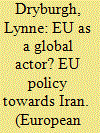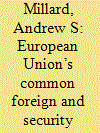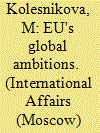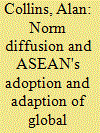|
|
|
Sort Order |
|
|
|
Items / Page
|
|
|
|
|
|
|
| Srl | Item |
| 1 |
ID:
085477


|
|
|
|
|
| Publication |
2008.
|
| Summary/Abstract |
This paper explores EU policy towards Iran to challenge the common implicit or explicit notion that the EU's 'actorness' in the international system rests primarily, or solely, on its Pillar I external relations. Utilising criteria developed to examine the 'actorness' of the EU, the article explores this policy area to demonstrate that the EU's 'actorness' resulted not only from the 'Community' aspects of foreign policy, but also from its Common Foreign and Security Policy (CFSP).
|
|
|
|
|
|
|
|
|
|
|
|
|
|
|
|
| 2 |
ID:
162509


|
|
|
|
|
| Summary/Abstract |
The European Union (EU) is at a turning point. With the bipolar order of the Cold War fast becoming a distant memory, the European Union must quickly establish itself on the global stage before it loses the opportunity to do so. With Northeast Asia fast emerging as a new economic giant and political center for world affairs, the EU must reform its Common Foreign and Security Policy in order to develop a reputation and image as a global actor of soft power, based on its long-standing values and peaceful diplomacy. However, despite major reforms in the Lisbon Treaty (2009), the EU has not been able to form cohesion amongst its members, thus hindering its progress in achieving such international recognition. This paper therefore analyses the reforms taken place so far and suggests further reforms that will build a strong foundation for a united and cohesive foreign policy. It will then look at how the reformed framework will allow the EU to establish itself as a global actor in political affairs, in particular in Northeast Asia.
|
|
|
|
|
|
|
|
|
|
|
|
|
|
|
|
| 3 |
ID:
191030


|
|
|
|
|
| Summary/Abstract |
THE European Union is steadily increasing its participation in shaping the global maritime agenda and asserting itself as a leading international player, setting key trends in the development of ocean governance. This trend can be seen in many EU conceptual and policy documents. In particular, the European Commission's 2022 Blue Economy Report uses the word "global" in various combinations 204 times and reflects the EU's main interests in modern international affairs, including "global food security," "global challenges," "global engagement," "global sustainable blue economy," "global leadership," "global partnerships," "global security and stability," etc..
|
|
|
|
|
|
|
|
|
|
|
|
|
|
|
|
| 4 |
ID:
158416


|
|
|
|
|
| Summary/Abstract |
In the wake of the Afghan missions, this article assesses the appetite in Australia and New Zealand for an ongoing relationship with NATO. Australia and New Zealand share many commonalities in their cultural, political, and economic profiles. Yet their identities in the realm of defense and security differ subtly, which has important implications for the reception of NATO’s strategic narratives in the Indo-Asia-Pacific region. Drawing on strategic narrative theory (SNT), we assess perceptions of NATO in Australia and New Zealand. By collecting and analyzing empirical data from political, academic, and military elites, we find that there is a keen desire for an on-going partnership with NATO, particularly in maintaining interoperability and in the area of “emerging security challenges.” Although the findings were mostly positive for NATO, New Zealand elites were more reticent about NATO involvement than those in Australia, where elites saw NATO and the Global Partnership as a potentially useful – if under-utilized – asset in areas of non-traditional security cooperation.
|
|
|
|
|
|
|
|
|
|
|
|
|
|
|
|
| 5 |
ID:
123004


|
|
|
|
|
| Publication |
2013.
|
| Summary/Abstract |
This article examines the diffusion of norms from a global actor, the Joint United Nations Programme on HIV/AIDS (UNAIDS), to the Association of Southeast Asian Nations (ASEAN). This entails using three processes of norm diffusion (localization, subsidiarity, and mimetic adoption) to examine and explain the adoption and adaption of global norms in the Association's four ASEAN Work Programmes (AWPs) on HIV/AIDS. In so doing, the article reveals that these different processes can be seen at work in different AWPs. The article also reveals the limitations of the AWPs and hence the lack of a coordinated regional response to the virus.
|
|
|
|
|
|
|
|
|
|
|
|
|
|
|
|
| 6 |
ID:
120822


|
|
|
|
|
| Publication |
2013.
|
| Summary/Abstract |
While global politics simulations have great potential to produce deeper learning of international affairs and IR theories and to promote the further development of technical skills, there are a variety of simulations to choose from, each with its own advantages and disadvantages for student learning. This paper engages in a comparative analysis of five distinct simulation types to examine the ways in which structural differences grant instructors more or less control over the learning environment. The five simulation types are the following: credit- and noncredit-bearing Model United Nations activities, hybrid Model UN activities, extended-in class simulations of real global actors and problems, and extended in-class simulations of fabricated global systems. The paper then considers the distinct opportunities for content, experiential, and theoretical learning within each simulation type.
|
|
|
|
|
|
|
|
|
|
|
|
|
|
|
|
|
|
|
|
|